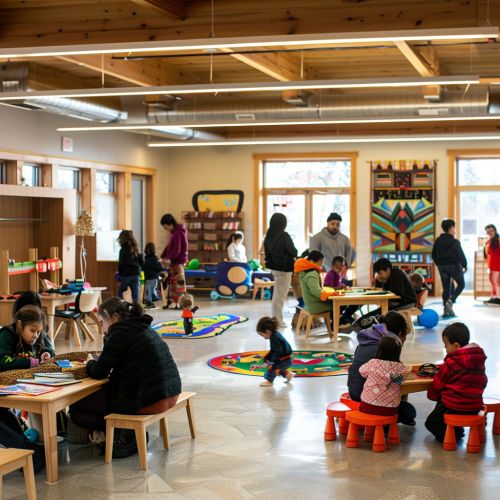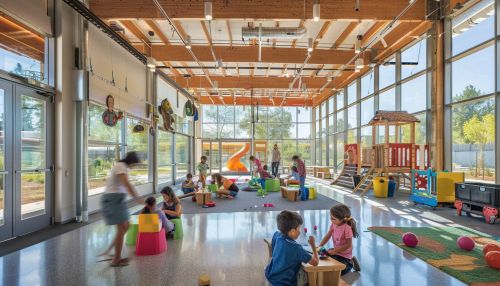Exosystem: Difference between revisions
No edit summary |
No edit summary |
||
| Line 43: | Line 43: | ||
Mass media and social networks play a pivotal role in disseminating social and cultural norms. These norms shape behaviors, attitudes, and expectations, indirectly influencing individual development. | Mass media and social networks play a pivotal role in disseminating social and cultural norms. These norms shape behaviors, attitudes, and expectations, indirectly influencing individual development. | ||
[[Image:Detail-79289.jpg|thumb|center|Community center with people engaging in various activities.]] | [[Image:Detail-79289.jpg|thumb|center|Community center with people engaging in various activities.|class=only_on_mobile]] | ||
[[Image:Detail-79290.jpg|thumb|center|Community center with people engaging in various activities.|class=only_on_desktop]] | |||
== Case Studies == | == Case Studies == | ||
Latest revision as of 21:52, 17 May 2024
Introduction
The term "exosystem" is a concept derived from ecological systems theory, developed by the renowned psychologist Urie Bronfenbrenner. This theory posits that human development is influenced by different types of environmental systems. The exosystem specifically refers to the larger social system in which an individual does not directly function but which nonetheless has a significant impact on their development and life experiences. This article delves into the intricacies of the exosystem, its components, and its influence on individuals and communities.
Components of the Exosystem
The exosystem encompasses various larger social structures and institutions that indirectly affect an individual. These components include:
Workplace
The workplace of a parent or guardian can significantly influence the life of a child, even though the child does not directly interact with this environment. Factors such as job stress, work hours, and job satisfaction can affect the parent’s behavior and, consequently, the child’s well-being.
Mass Media
Mass media, including television, newspapers, and the internet, play a crucial role in shaping societal norms, values, and behaviors. The content consumed through these media channels can have profound indirect effects on individuals, influencing their perceptions and actions.
Local Government
Local government policies and decisions can impact community resources, educational opportunities, and social services. These decisions, while not directly involving the individual, can create environments that either support or hinder personal development.
Extended Family
Interactions with extended family members, such as grandparents, aunts, and uncles, often occur less frequently than with immediate family but can still have a significant impact. The support or lack thereof from extended family can influence the dynamics within the immediate family.
Social Networks
Social networks, including friends, colleagues, and community groups, form an essential part of the exosystem. These networks provide support, resources, and information that can indirectly affect an individual’s life.
Influence of the Exosystem on Development
The exosystem exerts its influence through various mechanisms, including:
Stress and Coping Mechanisms
Stress experienced by parents or guardians in their workplace can trickle down to affect children. For instance, a parent experiencing high levels of job stress may have less patience and time for their children, potentially leading to negative developmental outcomes.
Access to Resources
Local government policies and social networks can determine the availability and quality of resources such as healthcare, education, and recreational facilities. Access to these resources can significantly impact an individual’s development and quality of life.
Social and Cultural Norms
Mass media and social networks play a pivotal role in disseminating social and cultural norms. These norms shape behaviors, attitudes, and expectations, indirectly influencing individual development.


Case Studies
Workplace Policies and Child Development
Research has shown that workplace policies, such as parental leave and flexible working hours, can have a significant impact on child development. For example, generous parental leave policies allow parents to spend more time with their newborns, fostering stronger parent-child bonds and promoting healthier development.
Media Influence on Adolescents
Studies have demonstrated that mass media can shape adolescents' body image, self-esteem, and behavior. Exposure to certain types of media content, such as violent video games or unrealistic body images, can lead to negative outcomes, including increased aggression and body dissatisfaction.
Community Resources and Educational Outcomes
Access to community resources, such as libraries, parks, and extracurricular programs, has been linked to better educational outcomes. Communities with abundant resources provide children with more opportunities for learning and development outside the classroom.
Theoretical Perspectives
Bronfenbrenner’s Ecological Systems Theory
Bronfenbrenner’s ecological systems theory provides the foundational framework for understanding the exosystem. According to this theory, human development is influenced by multiple environmental systems, ranging from immediate settings like the family (microsystem) to broader societal contexts (macrosystem).
Social Capital Theory
Social capital theory emphasizes the importance of social networks and the resources they provide. The exosystem can be seen as a source of social capital, offering support, information, and opportunities that indirectly benefit individuals.
Systems Theory
Systems theory views the exosystem as part of a larger, interconnected system. Changes in one part of the system can have ripple effects throughout, highlighting the complex and dynamic nature of human development.
Implications for Policy and Practice
Understanding the exosystem has significant implications for policy and practice. Policymakers and practitioners can leverage this knowledge to create environments that support positive development.
Workplace Policies
Implementing family-friendly workplace policies, such as flexible working hours and parental leave, can mitigate the indirect negative effects of job stress on children and families.
Media Literacy Programs
Media literacy programs can help individuals critically analyze media content, reducing the potential negative impacts of mass media on development.
Community Development
Investing in community resources and infrastructure can create supportive environments that promote healthy development and well-being.
Conclusion
The exosystem, though not directly experienced by individuals, plays a crucial role in shaping their development and life experiences. By understanding the components and influences of the exosystem, we can better appreciate the complex interplay of factors that contribute to human development. This knowledge can inform policies and practices aimed at creating supportive environments that foster positive outcomes for individuals and communities.
